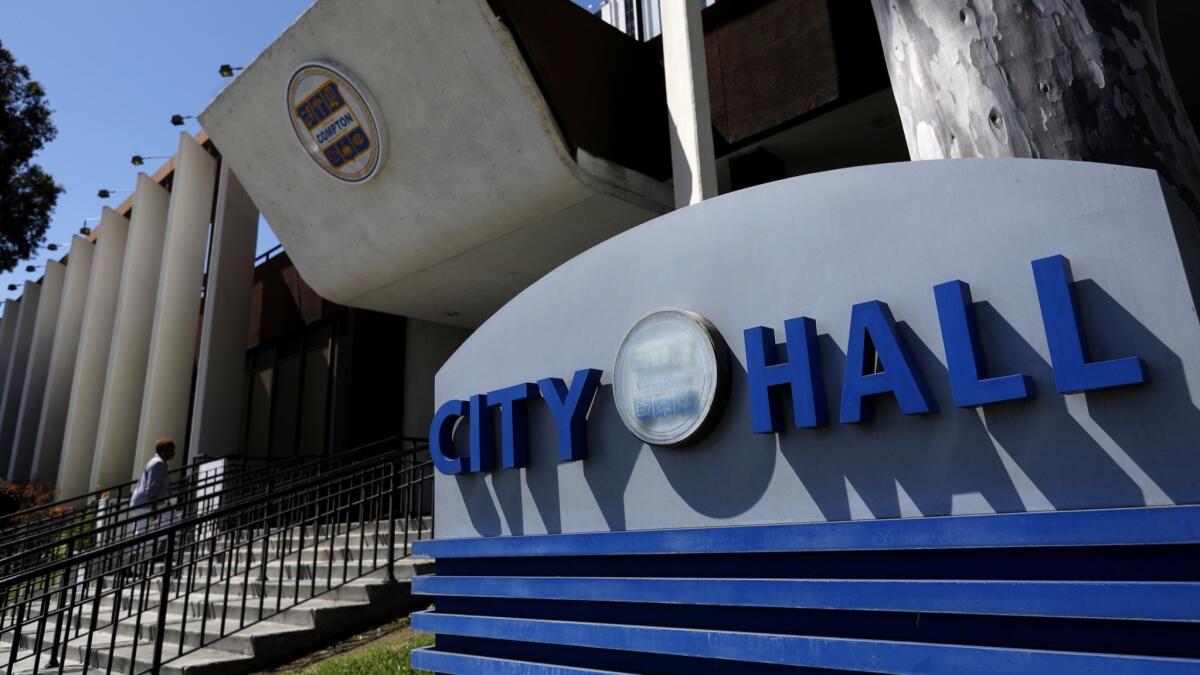Heist of 31 guns from Compton city vault is the latest problem in a scandal-plagued city

- Share via
The guns were kept in a 1920s-era vault in a municipal building on North Alameda.
Compton officials struggled for months to say where they came from, and now where a load of them have gone.
The city dismantled its police force 18 years ago. Were they left over from the old department? Were they sidearms removed four years ago from code enforcement officers who had taken to arming themselves? Were they purchased as part of a failed push to revive the police force in 2010?
Those were the questions last year when a new city manager, Cecil Rhambo Jr., learned about the stash in the old City Hall building from a code enforcement officer. He ordered them to be inventoried and turned over to the Los Angeles County Sheriff’s Department.
Deputies counted 198 weapons in March. When they went back to retrieve the guns in August, there were 167.
Now Rhambo, the Sheriff’s Department and the Bureau of Alcohol, Tobacco, Firearms and Explosives are asking: Who stole 31 of them?
Thieves made off with 23 Beretta .40-caliber pistols and eight Glock .40-caliber pistols.
Sheriff’s Department and Compton city officials notified the ATF, which opened an investigation in September and is offering a $10,000 reward for information leading to an arrest and conviction.
“None of them have shown up at crime scenes,” said Ginger Colbrun, an ATF spokeswoman in Los Angeles. “That’s in part why we decided to put out the reward.”
Colbrun said agents have the serial numbers of the missing weapons to aid with identifying them once they are located. A ballistics review revealed that none of the remaining weapons have been used in a crime, according to a Sheriff’s Department spokeswoman.
The mystery of the missing guns is the second troubling revelation to hit city leaders this month.
On March 15, the California state controller released an audit revealing that Compton officials overpaid themselves, charged dubious trips on city-issued credit cards and failed to safeguard taxpayer money. In one instance, a staffer stole millions of dollars over years, according to the audit.
Within just three years, the city’s lush spending and weak oversight converted a general fund surplus of $22.4 million a decade ago into a deficit of $42.7 million. The state review gave the city failing marks in 71 out of the 79 measures assessing internal accounting and administrative controls, a score that ranks Compton’s accountability as “nonexistent,” state Controller Betty Yee said.
And the gun theft wasn’t the first bout of faulty weapons oversight in the city’s history. Most infamously, a handgun booked into evidence at the Compton Police Department in 1986 was later used to shoot a Long Beach police officer in the head.
“This is the latest in a series of fiascoes in Compton’s history when it comes to law enforcement,” said Charles “Sid” Heal, a retired L.A. County sheriff’s commander and weapons expert. “It is fair to say it was likely an inside job.”
It’s likely that few people knew about the storage of the firearms and had the vault’s combination.
City insiders question whether the guns were stashed in expectation that the police force would be reinstated. The department’s closure was acrimonious and never fully accepted, with opponents claiming the decision was payback for police officers trying to recall then-Mayor Omar Bradley. Proponents argued that contracting with the Sheriff’s Department would be more affordable and effective in fighting crime.
In 2010, under then-Mayor Eric Perrodin, a former Compton police officer and staunch supporter of bringing back the municipal department, the City Council voted to revive the force. City officials bought $1.1 million in radio and communications equipment for the Police Department. But a year later, a budget deficit killed that plan. Some of the devices were stolen and sold, while others were lost in an arson fire started by a former Compton firefighter.
Rhambo, the city manager, said there are no plans to resurrect the police force. To do so would require a vote of the people. Plus, it would cost millions of dollars to build a new facility, recruit officers and purchase equipment, he said, and “the liability alone with law enforcement agencies is just cost prohibitive. I don’t see how cities can afford it quite frankly.”
He said he even recalled, as a sheriff’s captain in the Compton station over a decade ago, seeing leftover police weapons.
“There’s stuff a little too loosey-goosey around here,” he said. “I wanted to make sure we could account for those kind of things.”
Rhambo said he assumed guns were purchased with the radio equipment in 2010 and might have accounted for some or all of the stash. Perrodin said that any such expenditures would have been illegal and that he didn’t know of any, or of the stash at the old City Hall.
“It makes no sense” that those guns were kept in an unsecured building in known gang territory, Perrodin told The Times on Wednesday.
One city official, who asked to remain anonymous, said after the police force disbanded a number of code enforcement officers began carrying guns and became a “quasi-police department.”
In 2014, the city official alerted superiors that they were carrying firearms under the security guard permit, a classification that only allowed permit-holders to patrol a location, not drive around with a weapon. At the time, the city official said, there were about 15 gun-carrying code enforcement officers. Some were even taking their guns home.
“Code enforcement is about weeds and abatement,” the city official said. “They are not law enforcement officers, but they were driving around with guns on their hips like patrol officers.”
Compton code enforcers wore dark-colored uniforms, bulletproof vests, pepper spray, a baton and handcuffs and badges that resembled those of the Los Angeles Police Department, the city official said.
“You could not distinguish between them and LAPD from 20 feet away,” the city official said.
Then-City Manager G. Harold Duffey ordered the code enforcement officers to disarm and tasked the city official with collecting the weapons and taking inventory of them. The city official was directed to take them to the vault in the old City Hall.
That required a code and a unique key that only three departments were known to have access to — building and safety, the city attorney’s office and code enforcement, the official said. The official went inside for the first time and realized there were already guns there.
In white paper boxes on metal shelves, Berettas and Glocks were stacked in their original cases. Hunting rifles and beanbag guns were hung on the opposite wall.
“I was shocked because I thought the equipment went to other police agencies,” as is the common practice when a police department shutters, the city official said.
Revelations of missing guns and financial mismanagement come as Compton is, in some ways, in the midst of a makeover. Crime is down from more than a decade ago, when the city recorded 70 killings in a single year. Property values have increased almost 11% over the last year.
Councilman Isaac Galvan said there are no security cameras or metal detectors in the building and blamed “poor choices we made back then.”
“I hope those guns are not on the streets and no lives were lost with those guns,” said Galvan, whose younger brother was shot and killed in East Los Angeles two years ago.
Joyce Kelly, a longtime resident, said the previous administrations should have gotten rid of all the guns.
“There have been different entities, different people and different organizations who have used that building,” she said. “Somebody should’ve called the ATF or FBI to confiscate the guns.
“We have too many guns in Compton. We have too many killings. We need to get the guns out of the city.”
More to Read
Sign up for Essential California
The most important California stories and recommendations in your inbox every morning.
You may occasionally receive promotional content from the Los Angeles Times.














